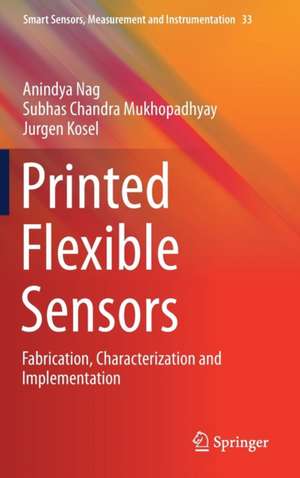Printed Flexible Sensors: Fabrication, Characterization and Implementation: Smart Sensors, Measurement and Instrumentation, cartea 33
Autor Anindya Nag, Subhas Chandra Mukhopadhyay, Jurgen Koselen Limba Engleză Hardback – 27 mar 2019
Din seria Smart Sensors, Measurement and Instrumentation
- 15%
 Preț: 593.59 lei
Preț: 593.59 lei - 20%
 Preț: 1291.75 lei
Preț: 1291.75 lei - 15%
 Preț: 642.36 lei
Preț: 642.36 lei - 15%
 Preț: 638.43 lei
Preț: 638.43 lei - 15%
 Preț: 646.11 lei
Preț: 646.11 lei - 15%
 Preț: 648.24 lei
Preț: 648.24 lei - 20%
 Preț: 646.62 lei
Preț: 646.62 lei - 15%
 Preț: 649.22 lei
Preț: 649.22 lei - 15%
 Preț: 649.06 lei
Preț: 649.06 lei - 15%
 Preț: 639.90 lei
Preț: 639.90 lei - 15%
 Preț: 649.54 lei
Preț: 649.54 lei - 18%
 Preț: 1127.78 lei
Preț: 1127.78 lei - 5%
 Preț: 1098.84 lei
Preț: 1098.84 lei - 15%
 Preț: 639.90 lei
Preț: 639.90 lei - 18%
 Preț: 1009.54 lei
Preț: 1009.54 lei - 15%
 Preț: 648.89 lei
Preț: 648.89 lei - 18%
 Preț: 726.85 lei
Preț: 726.85 lei - 18%
 Preț: 1006.72 lei
Preț: 1006.72 lei - 18%
 Preț: 954.93 lei
Preț: 954.93 lei - 15%
 Preț: 633.19 lei
Preț: 633.19 lei - 15%
 Preț: 645.60 lei
Preț: 645.60 lei - 18%
 Preț: 957.44 lei
Preț: 957.44 lei - 18%
 Preț: 1109.92 lei
Preț: 1109.92 lei - 5%
 Preț: 712.97 lei
Preț: 712.97 lei - 24%
 Preț: 631.20 lei
Preț: 631.20 lei - 15%
 Preț: 639.08 lei
Preț: 639.08 lei - 15%
 Preț: 646.62 lei
Preț: 646.62 lei - 18%
 Preț: 725.43 lei
Preț: 725.43 lei - 18%
 Preț: 1004.99 lei
Preț: 1004.99 lei
Preț: 642.36 lei
Preț vechi: 755.72 lei
-15% Nou
Puncte Express: 964
Preț estimativ în valută:
122.91€ • 128.68$ • 101.70£
122.91€ • 128.68$ • 101.70£
Carte tipărită la comandă
Livrare economică 05-19 aprilie
Preluare comenzi: 021 569.72.76
Specificații
ISBN-13: 9783030137649
ISBN-10: 3030137643
Pagini: 288
Ilustrații: IX, 198 p.
Dimensiuni: 155 x 235 mm
Greutate: 0.47 kg
Ediția:1st ed. 2019
Editura: Springer International Publishing
Colecția Springer
Seria Smart Sensors, Measurement and Instrumentation
Locul publicării:Cham, Switzerland
ISBN-10: 3030137643
Pagini: 288
Ilustrații: IX, 198 p.
Dimensiuni: 155 x 235 mm
Greutate: 0.47 kg
Ediția:1st ed. 2019
Editura: Springer International Publishing
Colecția Springer
Seria Smart Sensors, Measurement and Instrumentation
Locul publicării:Cham, Switzerland
Cuprins
Introduction.- Literature review.- Interdigitated Sensing and Electrochemical Impedance Spectroscopy.- Carbon Nanotubes-Polydimethylsiloxane Sensor.- Aluminium-Polyethylene Terephthalate Sensor.- Graphite-Polyimide Sensor.- Graphite-Polydimethylsiloxane Sensor.- Conclusion, Challenges and Future Work.
Textul de pe ultima copertă
This book presents recent advances in the design, fabrication and implementation of flexible printed sensors. It explores a range of materials for developing the electrode and substrate parts of the sensors, on the basis of their electrical and mechanical characteristics. The sensors were processed using laser cutting and 3D printing techniques, and the sensors developed were employed in a number of healthcare, environmental and industrial applications, including: monitoring of physiological movements, respiration, salinity and nitrate measurement, and tactile sensing. The type of sensor selected for each application depended on its dimensions, robustness and sensitivity. The sensors fabricated were also embedded in an IoT-based system, allowing them to be integrated into real-time applications.
Caracteristici
Describes important advances in flexible sensors and their healthcare, environmental and industrial applications Shows the growing demand for sensor-based applications in the real world Offers a valuable reference tool for graduates students, researchers and practitioners alike
